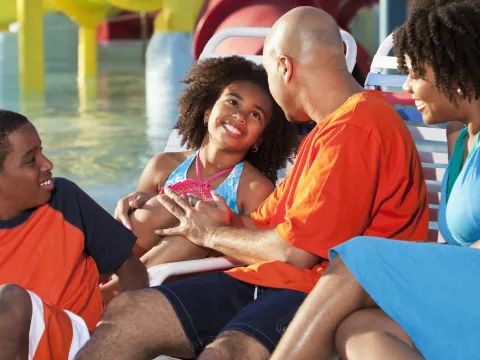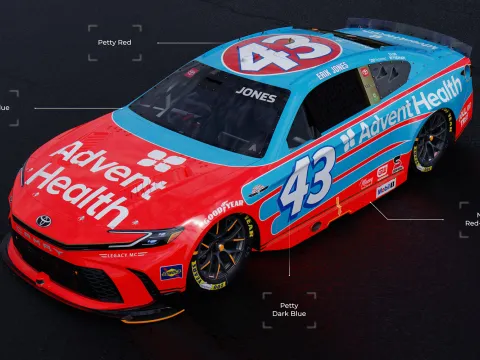- AdventHealth

A trip to an amusement park is a day to create lifelong memories to cherish with your children. Parks are full of fun encounters, once-in-a-lifetime activities, delicious food and thrilling rides. Parents of children with autism or those who have sensory disorders know, however, that these same amazing experiences can also be challenging for their child.
Fortunately, many amusement parks recognize that not all children are alike, and have prioritized inclusion to help all children have positive experiences. So wherever your travels take you, plan ahead to help your child with special needs feel whole throughout their special day with a few simple tips.
Prepare Your Child
Children on the autism spectrum or those with sensory disorders can struggle whenever their schedule changes. Talk with your child about the upcoming trip and get him or her ready by sharing what can be expected. Consider:
- Making a photobook of attractions at the park. Print photos from the internet and staple pages together for an easy resource your child can look through before the big day. And, take advantage of the walkthrough social stories available on many parks’ websites. These visual guides walk children through the park to showcase what they can expect when they get there.
- Looking at a map together and planning the day. Ask your child what rides you should visit and plan the day’s schedule.
- Preparing a well-stocked bag. Be sure to add sunblock, a hat, sunglasses, noise-cancelling headphones, a change of clothes, snacks and any other medical or support items your child may need.
- Talking to the adults on the trip to set expectations. Go over the plan with your partner, grandparents, or family members that will be joining you on the trip. Be clear about what they can expect – from how long you may be able to stay at the park, what rides you’ll enjoy, how they can help support you and your child at the park, and if you’ll need to do separate activities at any time during the trip.
Be honest with yourself and your family about what your child needs to create wonderful, happy memories. Focus on what works best for you to customize your experience to support your child and entire family.
Get the Support You Need
Fortunately today, amusement parks recognize that children have many different needs when it comes to waiting in line, or how they respond to bright lights, loud noises, crowds or hot temperatures. Many of these organizations offer services geared to children with autism or with a sensory disorder that can help everyone enjoy the day.
How Amusement Parks are Helping Kids
It’s important to help all children feel whole. So many amusement parks are taking steps to support children with autism and sensory disorders.
Walt Disney World and Disneyland
The happiest place on Earth is committed to making sure everyone enjoys their visit to the world-renowned theme parks. Services designed specifically for children on the autism spectrum or with a sensory disorder, and their families, are available at Walt Disney World in Orlando, Florida and Disneyland in Anaheim, California. Those resources include:
- Disability access service pass to help families and kids avoid long lines
- Rider Switch to let Mom and Dad enjoy a ride your child would prefer to sit out
- Specialty programs at select resorts that offer one-on-one pool or meal supervision and respite care for parents
- Strollers as wheelchairs program that allows children to remain in a stroller during a ride or attraction
- “Take a Break” areas to rest and relax from warm temperatures, loud noises and crowds
Plan your trip to Walt Disney World or Disneyland.
Aquatica
Aquatica is the first water park to become a Certified Autism Center by the International Board of Credentialing and Continuing Education Standards (IBCCES). This certification demonstrates the park’s commitment to creating experiences for every child and family that enters its doors. Services and support at Aquatica for children include:
- Certified staff, trained to cater and support all children who visit the park
- IBCCES Sensory Guide that shares insight on how a child may react or enjoy rides and attractions
- Low sensory area with fewer stimulations, sights and noise
- Quiet rooms to allow visitors to take a break
- Ride Accessibility Program that matches riders and rides for a safe, enjoyable experience
Learn more about planning your next family trip to Aquatica.
Dollywood Theme Park
Smoky Mountains is a great getaway for the whole family. Dollywood, the popular amusement park in Pigeon Forge, Tennessee, attracts many guests all year long. Now, the theme park is making sure everyone has the opportunity to enjoy their visit with services and support, such as:
- Boarding passes, which enables riders to bypass the line for rides and attractions
- Calming rooms to take a break
- Family restrooms that make taking children to the bathroom a little easier
- Parent swap ride programs to give everyone that wants one a chance to ride popular rides
- Walkthrough guide social stories, which allows visitors to preview the park before stepping foot in Pigeon Forge
Plan your trip and discover more resources online at Dollywood.com.
LEGOLAND Florida
Every child is invited to live the dream of being a LEGO builder for a day at LEGOLAND Florida. This amusement park caters to all families with many different resources and services. Most notably, the Blue Hero Pass allows children with autism and family members to immediately board the first ride of the day and bypass standby lines the rest of the day. Quiet rooms include sensory tools like noise-cancelling headphones, weighted blankets, fidget tables, and – of course – LEGO building tables.
Learn more about LEGOLAND’s services on their website.
Sesame Place
Sesame Place boasts rides, attractions, parades, and hotels based on the beloved children’s show. It was also the first theme park in the world to be designated as a certified autism center by the IBCCES. Staff members have received specialized training to make sure all guests are comfortable, including education on autism, sensory awareness, social skills, emotional awareness and much more.
Sesame Place also offers specific services and resources for families, including:
- Dining options that include quieter environments and limited character interaction
- IBCCES sensory guide that outlines how a child may be affected by rides and attractions
- Low sensory areas with fewer crowds and distractions
- Noise-cancelling headphones
- Parade viewing designated for children and families
- Quiet rooms to take a break from noise and stimulation in the park
- Ride accessibility program that matches guests to appropriate rides
Children are also invited to meet Julia, Sesame Street’s first character with autism. Families can have their photo taken with Julia and introduce children to someone just like them.
Learn more about planning a trip to Sesame Place, and the resources available to children on the spectrum by visiting the park’s website.
Feel the Joy
Now, thanks to the commitment and resources available at these popular theme parks (and many others), children and families are able to experience the fun and once-in-a-lifetime memories made on theme park vacations. If you’re planning a trip to an amusement park not listed here, visit the park’s website or call customer service to ask about services available your child’s specific needs. And remember, you know your child best and how to prepare him or her for a wonderful and enjoyable trip for everyone to feel healthy and whole.
If you’re planning to travel, locate your trusted AdventHealth experts who can help guide you through any planned or unexpected family health needs while you’re away from home. We’re always here to support you on your path to feeling whole.


